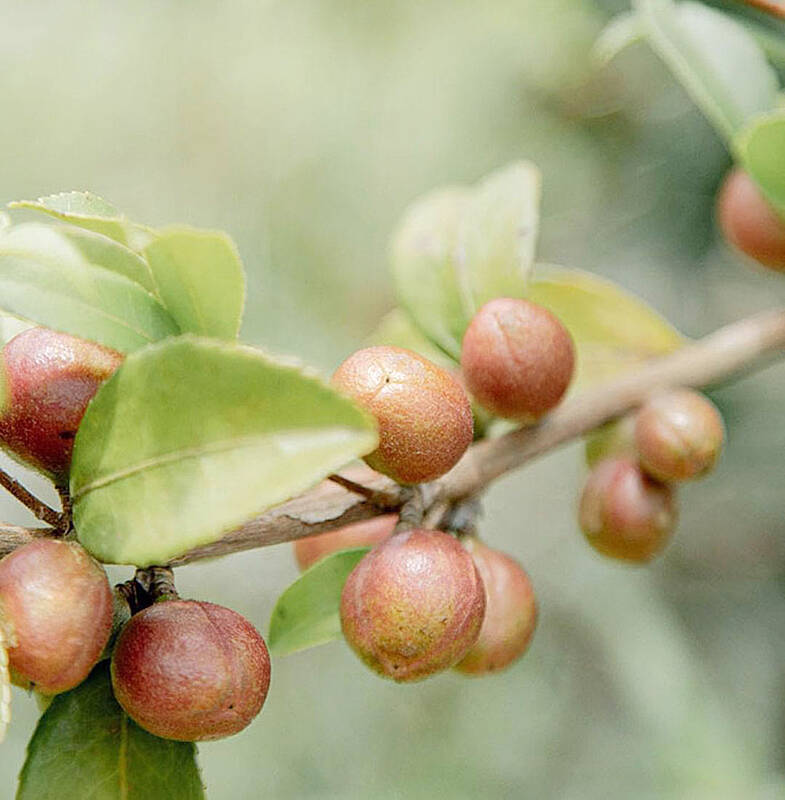Camellia oil farms in the Dananao Plain (大南澳平原) in Yilan County have increased to 17.8 hectares over the past eight years as part of local efforts to promote the “green gold” sector.
Camellia oil, also known as tea seed oil and “Oriental olive oil,” has become popular among Taiwanese after a tainted oil scandal in 2014 that prompted the public to be more vigilant in their oil use.
In 2016, 11 farmers began growing 3,000 oil-seed camellia trees over 5 hectares and obtained the support of a local company named Cha Tzu Tang, which signed a contract with them to purchase their harvests.

Photo courtesy of Yilan County Suao Township’s camellia oil production and marketing group
Cha Tzu Tang purchased their camellia fruit at guaranteed prices to produce camellia oil and assisted in marketing and promotion by developing bath products made from camellia oil.
The profits generated by the camellia oil farms have attracted more farmers to get involved.
The popularity of the product has increased thanks to the quality of the camellia fruit grown by eco-friendly farming methods.

Photo courtesy of Yilan County Suao Township’s camellia oil production and marketing group
The first production and marketing group for camellia oil was set up earlier this month in Yilan County’s Suao Township (蘇澳) after the total area of camellia oil farms in the region exceeded the threshold of 10 hectares, and more than 40 people from the government, academia and industries participated in the founding ceremony, which was a milestone in the nation’s development of the camellia oil industry.
Ten thousand oil-seed camellia trees were planted in the region, with those grown in Jhaoyang Community (朝陽社區) accounting for the biggest portion with more than 6,000 trees covering 11 hectares, projected to yield a camellia fruit harvest of up to 40 tonnes every year.
Chen Yu-ting (陳昱廷), head of Suao Township’s camellia oil production and marketing group, on Saturday said that 20 farmers have joined camellia oil farming in Dananao, and the group would assist them in procuring farm chemicals and machinery, management, and education and training to enhance their production quality.
The group would also continue to cultivate successors of younger generations and introduce mechanized farming methods, to transform the camellia oil-producing region into one of Yilan County’s local features, he said.
Another key issue would be sourcing water due to the impact of rising temperatures, Chen said.
Irrigation routes would be renewed and smart monitoring technology would be introduced to facilitate precision irrigation to cope with extreme weather conditions, while organic accreditations and a traceability system would be implemented to make camellia oil one of Taiwan’s signature oil products, he said.
Suao Township Farmers’ Association chief of staff Huang Tsan-jan (黃燦然) said the township has many agricultural products, such as oranges, cantaloupes, watermelons and chilis that have been the focus of promotion.
As the contractual farming area of oil-seed camellia trees has expanded to more than 17 hectares, the production and marketing group would help communicate with the government on behalf of the farmers to support the industry, expecting to make camellia fruit an important Suao Township cash crop, he said.

The inspection equipment and data transmission system for new robotic dogs that Taipei is planning to use for sidewalk patrols were developed by a Taiwanese company, the city’s New Construction Office said today, dismissing concerns that the China-made robots could pose a security risk. The city is bringing in smart robotic dogs to help with sidewalk inspections, Taipei Deputy Mayor Lee Ssu-chuan (李四川) said on Facebook. Equipped with a panoramic surveillance system, the robots would be able to automatically flag problems and easily navigate narrow sidewalks, making inspections faster and more accurate, Lee said. By collecting more accurate data, they would help Taipei

TAKING STOCK: The USMC is rebuilding a once-abandoned airfield in Palau to support large-scale ground operations as China’s missile range grows, Naval News reported The US Marine Corps (USMC) is considering new sites for stockpiling equipment in the West Pacific to harden military supply chains and enhance mobility across the Indo-Pacific region, US-based Naval News reported on Saturday. The proposed sites in Palau — one of Taiwan’s diplomatic allies — and Australia would enable a “rapid standup of stored equipment within a year” of the program’s approval, the report said, citing documents published by the USMC last month. In Palau, the service is rebuilding a formerly abandoned World War II-era airfield and establishing ancillary structures to support large-scale ground operations “as China’s missile range and magazine

A 72-year-old man in Kaohsiung was sentenced to 40 days in jail after he was found having sex with a 67-year-old woman under a slide in a public park on Sunday afternoon. At 3pm on Sunday, a mother surnamed Liang (梁) was with her child at a neighborhood park when they found the man, surnamed Tsai (蔡), and woman, surnamed Huang (黃), underneath the slide. Liang took her child away from the scene, took photographs of the two and called the police, who arrived and arrested the couple. During questioning, Tsai told police that he had met Huang that day and offered to

BETTER SERVICE QUALITY: From Nov. 10, tickets with reserved seats would only be valid for the date, train and route specified on the ticket, THSRC said Starting on Nov. 10, high-speed rail passengers with reserved seats would be required to exchange their tickets to board an earlier train. Passengers with reserved seats on a specific train are currently allowed to board earlier trains on the same day and sit in non-reserved cars, but as this is happening increasingly often, and affecting quality of travel and ticket sales, Taiwan High-Speed Rail Corp (THSRC) announced that it would be canceling the policy on Nov. 10. It is one of several new measures launched by THSRC chairman Shih Che (史哲) to improve the quality of service, it said. The company also said